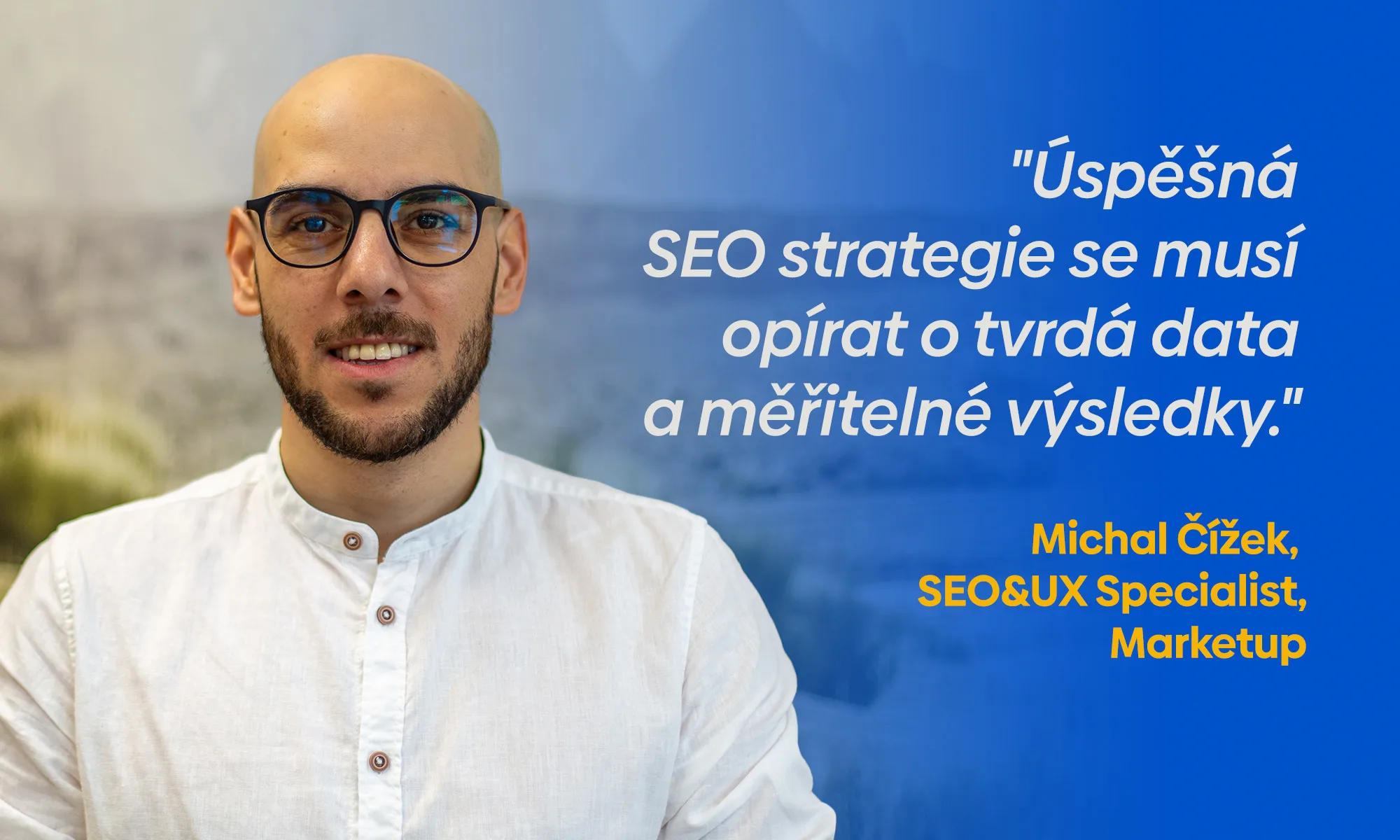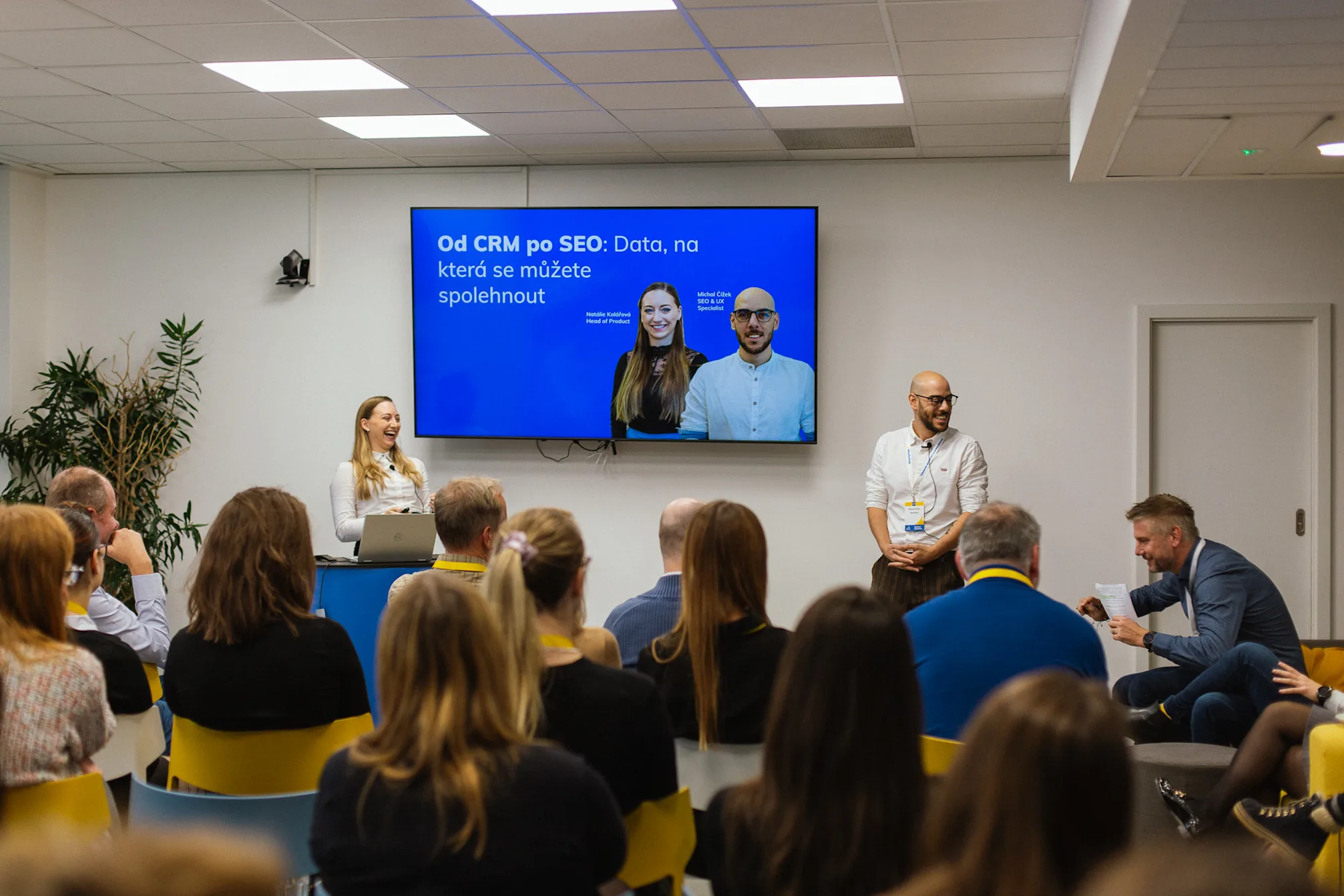Michal Čížek
17. 2. 2025
Read more


Discover how artificial intelligence (AI) is transforming traditional SEO and how new approaches, such as GEO and AIO, are impacting website optimisation in today's digital landscape.
Table of Contents
Introduction to SEO, GEO, and AIO
The Current State of SEO
The Rise of Artificial Intelligence in Search
Transitioning to GEO: Optimisation for Generative Search Engines
The Role of AIO in Modern Optimisation
Strategies for Website Optimisation in the AI Era
The Future of Search and Conclusion
1. Introduction to SEO, GEO, and AIO
Digital marketing strategies are continually evolving to enhance content visibility and accessibility. Traditional search engine optimisation (SEO) has long been the foundation of these efforts. However, the rise of artificial intelligence has introduced new approaches like Generative Engine Optimisation (GEO) and Artificial Intelligence Optimisation (AIO).
What is SEO (Search Engine Optimisation)?
SEO involves techniques aimed at improving website rankings in traditional search engines like Google and Bing. Its goal is to increase organic traffic through improved keyword rankings, content optimisation, technical site enhancements, and high-quality backlinks.
What is GEO (Generative Engine Optimisation)?
With the rise of AI tools like ChatGPT, the need to optimise content for generative search engines emerged. GEO aims to ensure content appears in AI-generated answers, not just traditional search results. This involves structuring content clearly, integrating relevant citations, statistics, and providing broader context.
What is AIO (Artificial Intelligence Optimisation)?
AIO takes optimisation further by focusing on content specifically tailored for AI systems in general, not just search engines. It involves creating content that directly answers user questions via AI systems, ensuring the content genuinely adds value. AIO emphasises user intent and aims to deliver precise, helpful responses.
These three approaches reflect evolving user search and content consumption habits. While SEO targets traditional search engines, GEO and AIO adapt to AI's growing influence in digital interactions.
2. The Current State of SEO
SEO has long been a cornerstone of digital marketing, focused on improving website visibility in search results (SERPs). Traditional SEO concentrates on:
Keywords: Identifying and incorporating relevant keywords into content.
Backlinks: Building quality backlinks from authoritative websites.
Technical aspects: Optimising site speed, responsive design, and URL structure.
These strategies have been effective historically but must evolve (not disappear) with the rise of AI.

Source: https://www.istockphoto.com
AI’s Impact on SEO
AI significantly affects how search engines rank content. Algorithms like Google’s BERT and RankBrain use AI to better understand user queries, impacting traditional SEO practices. RankBrain analyses unfamiliar terms based on context, while BERT provides nuanced understanding, ensuring more accurate search results.
Changing User Behaviour
Technologies like voice assistants and mobile devices change how users search. Voice searches involve longer conversational queries, increasing the importance of long-tail keywords. Users now naturally ask questions like, "What's today's weather in Prague?" instead of "weather Prague." Content must therefore be optimised for these natural-language queries. With around 80% of searches performed on mobile devices, ensuring mobile optimisation is also critical.
Adapting SEO Strategies
Greater focus on user intent, content quality, domain authority, and technical website aspects is more vital than ever. Integrating AI tools into SEO processes helps better analyse data and tailor content to user needs. Structured data (schema markup) boosts visibility in featured snippets, and optimising for voice search is essential due to AI assistants commonly using "position zero" results.
3. The Rapid Rise of Artificial Intelligence in Search
AI fundamentally changes how search engines interpret user queries, enabling more accurate and personalised results. Companies like Google integrate AI (Gemini) through technologies such as BERT and RankBrain to better understand search intent.
Growth of AI-Powered Tools
Tools like ChatGPT and DeepSeek show rapid user adoption, indicating a shift toward AI-powered search providing interactive, tailored responses. Our data confirms significant traffic originating from AI crawlers, particularly ChatGPT.
Personalisation and User Experience
AI helps search engines personalise results based on past interactions and preferences, improving overall user experiences. This mirrors familiar personalisation from mobile and desktop environments.
Impact on Traditional SEO
Traditional keyword-focused methods become less effective as search engines prioritise understanding user intent and content quality (EEAT: Experience, Expertise, Authoritativeness, Trustworthiness). Content creators and SEO specialists must adapt their strategies, emphasising valuable content and user experience.
The Future of Search with AI
Artificial intelligence will increasingly play a central role in search engine development. With ongoing advancements in machine learning and natural language processing (LLM models), search engines will better understand complex queries and deliver even more precise responses. However, there's also a significant risk of generating vast amounts of low-quality, "content-for-content's-sake" (toxic content). How these methods will be penalised or filtered remains unclear, but this certainly isn't the right path forward.
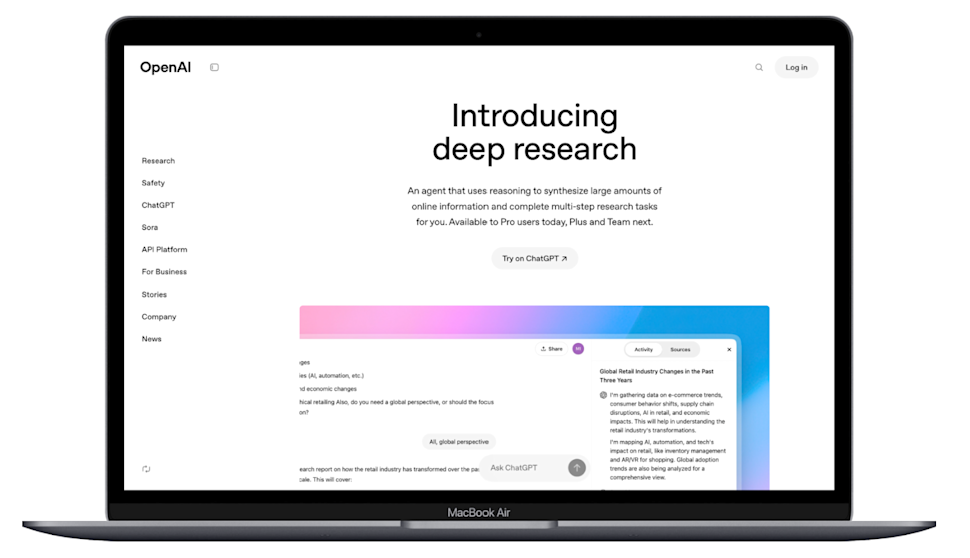
Source: https://openai.com/index/introducing-deep-research/
4. Transitioning to GEO: Optimisation for Generative Search Engines
With the emergence of generative search engines such as ChatGPT, Bing Chat, and Google Bard, the way users access information online is evolving. Unlike traditional SEO, which targets human preferences, GEO focuses on AI systems and their behaviours. This includes creating content comprehensible to AI, embedding relevant citations and statistics, and providing broader context.
Key GEO Aspects
Quality Content: Generative engines prefer content that is well-structured, informative, and relevant to user queries. Content should deliver deep, valuable information addressing potential user questions.
Natural Keyword Integration: Keywords should be naturally integrated into content to maintain readability and relevance. Generative search engines favour contextually used keywords, enhancing user experience.
Structured Data: Implementing structured data, such as schema markup, helps AI better understand content and context, increasing the likelihood of inclusion in generated responses.
Citations and Sources: Credible citations and statistics enhance content authority, crucial for AI selection.
Readability Optimisation: Clear and concise content easily understandable by both users and AI systems, using short paragraphs, headings, and bullet points.
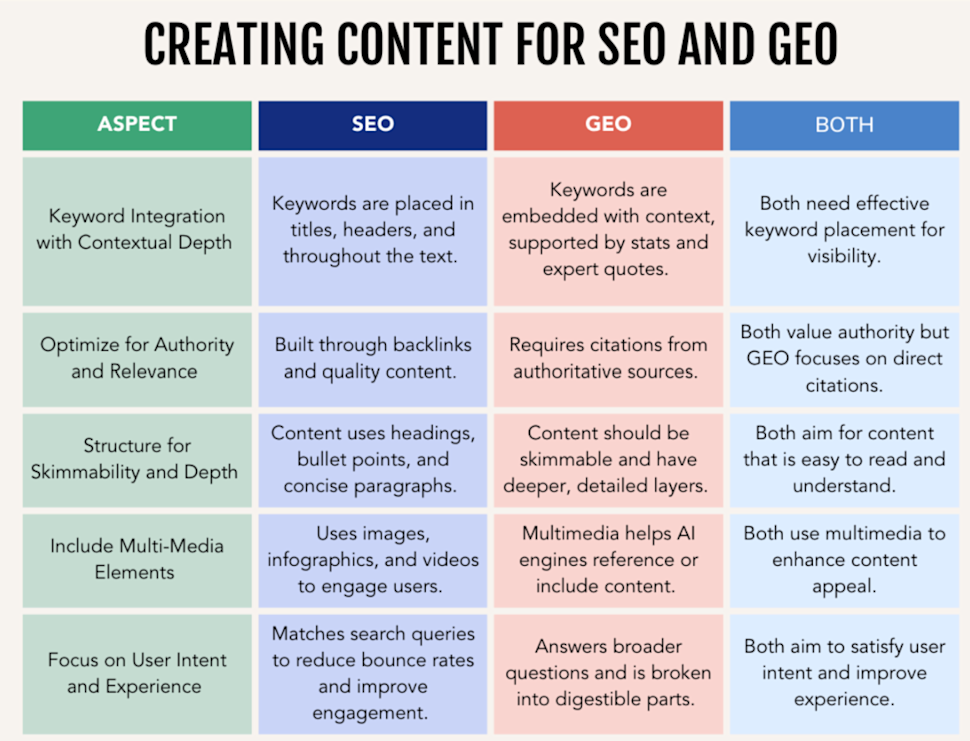
Source: https://foundationinc.co/lab/seo-vs-geo
Implementing GEO Strategies
For effective GEO implementation, understanding how generative search engines function and what influences their content selection is crucial. This involves tracking AI technology developments, analysing user behaviour changes, and adapting content to meet new requirements.
GEO’s Significance for Digital Marketing
With increasing AI usage in search, GEO will become increasingly critical. Businesses adopting GEO strategies will be better equipped for these changes and more effectively reach their target audiences. This not only means optimising content visibility but also ensuring accurate, relevant, and trustworthy information. The shift to GEO represents a major evolution in content optimisation, reflecting the dynamic nature of online search in the AI era.
5. The Role of AIO in Modern Optimisation
Artificial Intelligence Optimisation (AIO) plays a crucial role in tailoring content and strategies to effectively collaborate with AI technologies.
Key AIO Aspects
AI-Powered Data Analysis: Advanced AI tools enable deep analysis of extensive data, identifying user behaviour patterns and preferences, informing content that resonates better with target audiences.
Content Optimisation for AI Systems: AIO focuses on content easily processed by AI. Structured data implementation enhances AI comprehension, increasing the chances that content is accurately interpreted and presented.
Personalised User Experience: Leveraging AI delivers personalised experiences by analysing user behaviour and preferences, recommending content, products, or services that meet individual user needs, thus boosting engagement and satisfaction.
Automation and Process Efficiency: AI tools automate routine tasks like data analysis, content performance monitoring, and trend identification, allowing marketing teams to focus on strategic tasks and improving overall process efficiency.
Enhanced Content Quality: AI identifies content gaps and suggests improvements, resulting in more relevant, higher-quality content aligned with audience preferences.
6. Strategies for Website Optimisation in the AI Era
As AI's influence grows, adapting SEO strategies to new technologies and user behaviours is essential.
Structured Data Implementation
Schema markup helps AI systems understand website content, increasing visibility in search results such as rich snippets.
Creating Quality, Relevant Content
Content remains vital, even in the AI era. Use AI tools like Google Keyword Planner or Ahrefs for deep keyword analysis, identifying high-potential topics and trends.
Voice Search Optimisation
With voice assistants growing in popularity, content must accommodate conversational queries and localised search, aligning closely with natural language queries.
Personalisation
AI enables personalised user experiences, increasing engagement by tailoring content to individual visitor data, using tools like Dynamic Yield or Optimizely.
AI Tools for Data Analysis
Tools like DeepCrawl or Screaming Frog use machine learning for efficient web structure analysis, identifying technical issues, and recommending improvements.
Ensuring AI Accessibility
Ensure content is accessible to AI systems. Avoid aggressive bot blocking that might render your site invisible to AI, negatively impacting your online presence.
SEO Strategies for AI-Generated Responses
Optimise content specifically for AI interpretation, ensuring accuracy and relevance as AI increasingly shapes content discovery.
7. The Future of Search and Conclusion
AI is rapidly becoming central to website optimisation. Invest in understanding GEO and AIO strategies to stay competitive. If you need help with optimisation, reach out to us—we'd be glad to guide you through this new digital marketing era. Success will hinge on adapting to new technologies and continuously monitoring evolving user behaviours.
Google AI Overviews, currently tested in Germany, Italy, and Switzerland, will soon arrive in the Czech Republic, indicating a significant shift beyond the US and global markets.
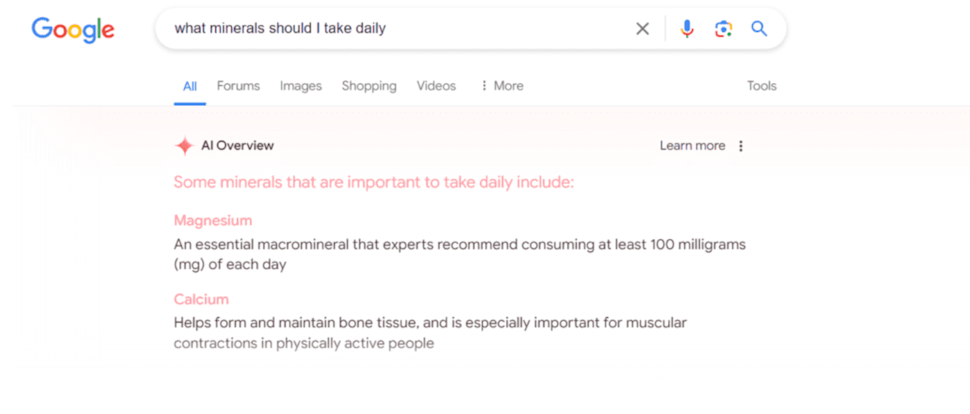
Source: https://returnonnow.com/2024/06/google-ai-makes-seo-more-important/
Google AI Overview
Google AI Overviews are AI-generated summaries appearing directly within traditional search engine results pages (SERPs). Their purpose is to provide users with a quick overview of key information related to their search queries.
How it works:
Uses Google's advanced language models (e.g., Gemini).
Provides concise summaries directly within traditional search results.
Does not allow interactive follow-up questions or further user interaction.
SGE (Search Generative Experience)
SGE is Google's new experimental search format, which not only summarises information but also allows users to interactively engage with the search engine by asking additional questions directly within the search results.
How it works:
Generates detailed, context-rich answers.
Enables interactive dialogue, allowing users to ask follow-up questions within the search environment.
Provides an engaging, conversational experience similar to chatbots (e.g., ChatGPT).
Main differences
Google AI Overview: Static, AI-generated summaries directly in search results.
SGE: Dynamic, interactive conversation with AI directly within the search experience.
Sources
https://www.dexfinity.com/cz/seo-cz/seo-trendy-2024-nespadnete-z-pozic-v-ere-ai/
https://www.seoconsult.cz/blog/jak-zajistit-budoucnost-sveho-webu-v-ere-ai-vyhledavani
https://mailchimp.com/resources/generative-engine-optimization/
https://www.impnet.cz/blog/umela-inteligence-a-seo-jak-nam-muze-ai-pomoci/
https://www.advisio.cz/blog/umela-inteligence-a-seo-proc-to-proste-nezadat-do-chatgpt/
https://www.onlinetoro.sk/je-tradicne-seo-mrtve-ako-sa-pripravit-na-ai-vyhladavanie-aio/
https://www.seroundtable.com/google-ai-overviews-in-germany-switzerland-italy-38988.html

